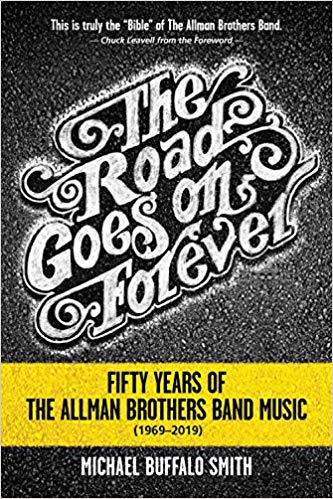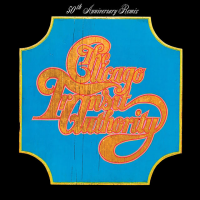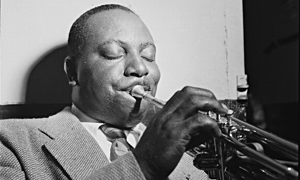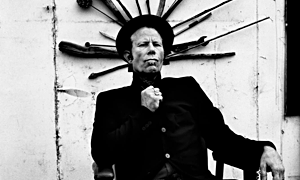Home » Jazz Articles » Book Review » The Road Goes on Forever: Fifty Years of The Allman Brot...
The Road Goes on Forever: Fifty Years of The Allman Brothers Band Music (1969-2019)
 The Road Goes on Forever: Fifty Years of The Allman Brothers Band Music (1969-2019)
The Road Goes on Forever: Fifty Years of The Allman Brothers Band Music (1969-2019) Michael Buffalo Smith
352 Pages
ISBN: # 978-0881467123
Mercer University Press
2019
In approaching Michael Buffalo Smith's book The Road Goes On Forever, it is absolutely essential to take the subtitle literally. In Fifty Years of The Allman Brothers Band Music (1969-2019), the author collects information on the recordings, performances, and musicianship of the seminal Southern rock band, (sans the sensationalism that earmarked Scott Freeman's
Smith has no pretense to objectivity, so the tone of his writing is sometimes folksy to a fault. To his great credit, he prefers to proffer just the facts, as in the section devoted to all the records upon which founding member Duane Allman played as a session musician. The author's pithy summary of the sequence of events involving Dickey Betts' ouster from the Allmans in 2000 is also indicative of the way he skirts controversy without seeming to give the topic(s) short shrift. And when he wants to editorialize, he does so with great relish, as in his coverage of the 2009 Beacon Theater shows celebrating the fortieth anniversary of the Brothers: based on his play-by-play via the late drummer Butch Trucks' short-lived video platform Moogis, none of the participants could do anything wrong, including the band itself plus a litany of guests ranging from Bruce Willis(!?) to Eric Clapton to Levon Helm.
The depth of knowledge a reader brings to these three-hundred fifty-plus pages will determine exactly how useful The Road Goes On Forever will be. On the one hand, it may be redundant for anyone who's read about the ABB extensively enough to be familiar with Willie Perkins' No Saints, No Saviors: My Years With The Allman Brothers Band (Mercer University Press, 2005). On the other hand, novices or non-readers will discover a handy reference tool to function as a point of departure from which to embark upon their academic research.
Caveat emptor though: Fifty Years of The Allman Brothers Band Music (1969-2019) contains neither index entry nor discussion for either Randy Poe's splendid and absolutely essential bio of the elder Allman Skydog: The Duane Allman Story (Backbeat, 2008)or Galadrielle Allman's touching Please Be with Me: A Song for My Father, Duane Allman (Spiegel & Grau, 2014). These are egregious omissions to say the least for a book that purports, at least implicitly, to be comprehensive.
Thus, a careful perusal of the stock photos to the extensive appendices as well as the multiple interviews in Michael Buffalo Smith's book from has its rewards, limited as they might be. Dialogues with linchpins of the various lineups, including but not limited to charter members/co-founders Dickey Betts and Butch Trucks, carry the potential to add real substance here, but the conversations usually consist of as much mutual glad-handing as genuine insight (though the voluble Warren Haynes is, not surprisingly, the exception to that self-imposed rule).
Smith himself isn't overly-articulate, much less eloquent, in thought or word, so any truly rarefied exchanges of ideas are precluded. And then there's the Allmans' long-standing reticence in speaking with the press at all, unless it's in the narrowly-circumscribed context of Alan Paul's quasi-puff piece One Way Out: The Inside History of the Allman Brothers Band (St. Martin's Press, 2014). That said, the tone of the conversations is the sound of Smith ever-so-wisely speaking to his audience, a wise choice if there ever was one in such a provincial atmosphere that surrounds almost all things Brother-related.
As one-time Brother keyboardist Chuck Leavell points out in his forward, The Road Goes On Forever can represent something of an encyclopedia devoted to the Allman Brothers Band. But the tome really comes across more like an expanded, glorified discography one within which the lapses in scholarship, while apparently relatively minor, call into some question the author's depth of familiarity with all aspects of the Allman milieu. He details the late Phil Walden's early organization of business enterprises in collaboration with Frank Fenter, but then references and indexes (with an 'e' on the surname) a 'Johnny Pudell;' is this the artist/booking agent who began to make a name for himself coincidental with the rise of the ABB? The author's oversight gives some pause regarding the arbitrary nature of his knowledge, but only a little less so than fact the hometown (Macon, Georgia) publisher didn't catch the faux pas in its fact-and and spell-checking processes.
No doubt issued to at least superficially commemorate the half-decade anniversary of the formation of the Allman Brothers band to which its title alludes, Fifty Years of The Allman Brothers Band Music (1969-2019) should come in handy for both fans and dilettantes alike, just so long as both demographics adjust the degree to which they accept the content therein at face value. But hypothesizing along those lines constitutes overthinking in this case: better to leave the soft covers to become dog-eared over time through constant usage and allow each user's depth/breadth of interest dictate how much further afield to go.
Tags
Book Reviews
Allman Brothers Band
Doug Collette
Mercer University Pres
Duane Allman
Dickey Betts
Eric Clapton
Levon Helm
The Allman Brothers Band
About Allman Brothers Band
Instrument: Band / ensemble / orchestra
PREVIOUS / NEXT
Support All About Jazz
 All About Jazz has been a pillar of jazz since 1995, championing it as an art form and, more importantly, supporting the musicians who make it. Our enduring commitment has made "AAJ" one of the most culturally important websites of its kind, read by hundreds of thousands of fans, musicians and industry figures every month.
All About Jazz has been a pillar of jazz since 1995, championing it as an art form and, more importantly, supporting the musicians who make it. Our enduring commitment has made "AAJ" one of the most culturally important websites of its kind, read by hundreds of thousands of fans, musicians and industry figures every month.



























